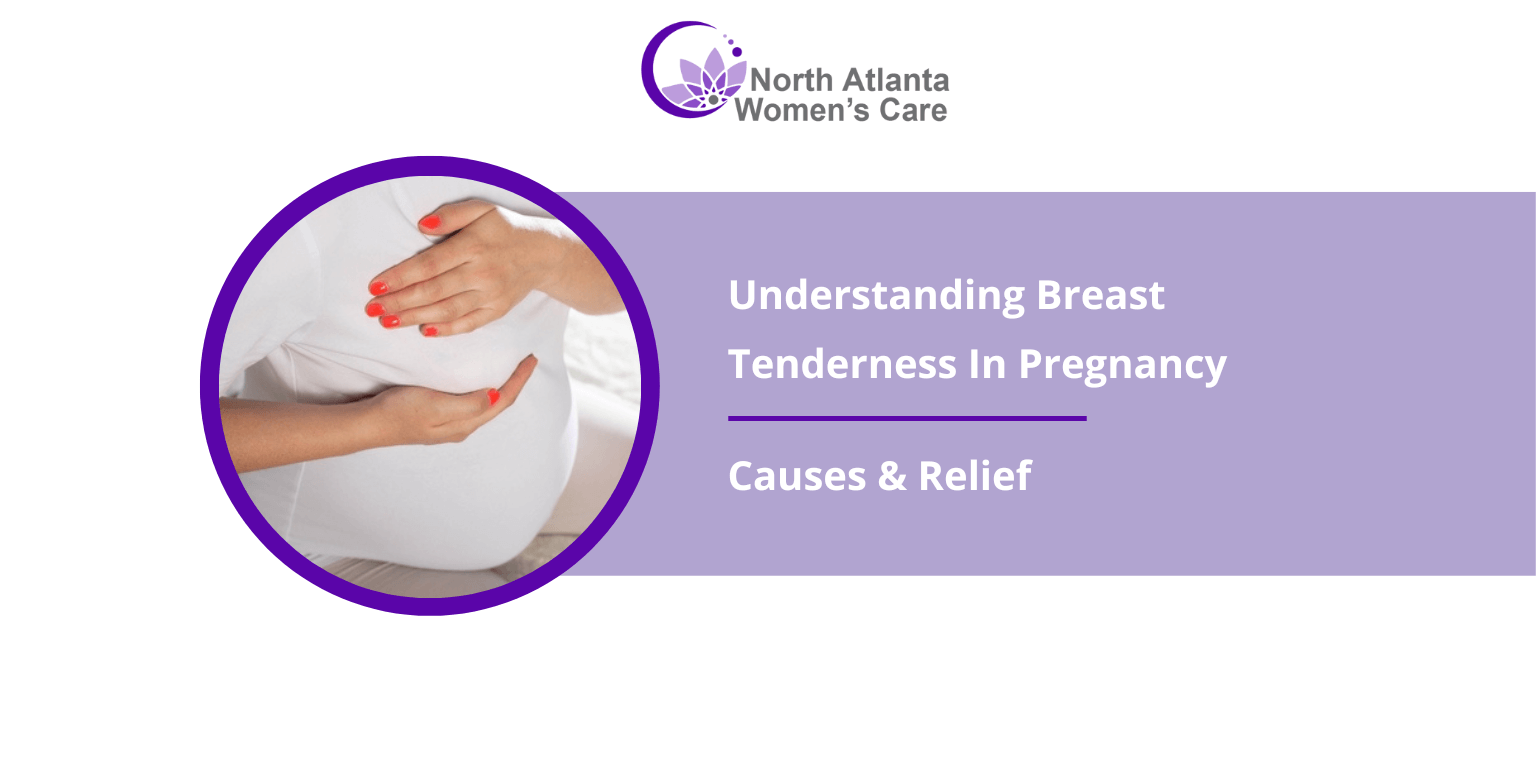Understanding Breast Tenderness In Pregnancy: Causes & Relief

Pregnancy is a beautiful journey filled with joy and anticipation. However, it is not without its challenges. One common discomfort that many expecting mothers experience is breast tenderness, which occurs in 76.2% of pregnant women according to research. Breast tenderness is one of the most common pregnancy symptoms that may occur around 4 to 7 weeks into the pregnancy and may last throughout the first trimester. Understanding why this happens and how to manage it can help you navigate this aspect of pregnancy more comfortably.
Hormonal Changes And Breast Tenderness in Pregnancy
During pregnancy, the hormonal changes in your body can lead to soreness, pain, and sensitivity in your breasts.
In the first trimester, breast tenderness is often one of the earliest signs of pregnancy. Your breasts may feel swollen, heavy, and sore. You may begin to experience fullness in the breasts and a tingly sensation around your nipples.
As your pregnancy progresses into the second trimester, your hormone levels continue to rise, contributing to ongoing breast tenderness and a change in color of the pigmented area around your nipples called areolas. You may also experience your breasts leaking some yellow ‘pre-milk’ fluids.
By the third trimester, your breasts may have increased in size, and the tenderness may persist as your body prepares for lactation while your areola darkens.
Causes Of Breast Tenderness in Pregnancy
While preparing your body to nurture a baby, your body goes through substantial changes, one of which may cause sore breasts during pregnancy. Breast pain while pregnant is caused by:
- Hormonal Changes: As soon as conception occurs, your body starts producing higher levels of hormones, such as estrogen and progesterone. These hormones are crucial in preparing your body for nurturing a baby. However, they can also cause your breasts to become tender and sensitive.
- Increased Blood Flow: A sudden surge of blood flow to the breasts can cause them to feel more sensitive.
- Growth of Milk Ducts: Due to the expansion of breast tissue, pregnancy may contribute to the discomfort.
- Breast Engorgement: Some women may also experience breast engorgement, which is a buildup of fluid and milk in the breasts. This can lead to increased tenderness and swelling.
It is important to note that every woman's experience with sore breasts during pregnancy is unique. While some may experience mild discomfort, others may find it more intense. Factors such as genetics, pre-existing breast conditions, and individual hormone levels can all contribute to the severity of breast tenderness.
Tips For Managing Breast Tenderness in Pregnancy
While breast tenderness during pregnancy is a normal occurrence, there are steps you can take to manage the discomfort and alleviate the symptoms. Here are some helpful tips:
- Wear a supportive bra: Invest in a comfortable, well-fitting bra that provides proper support. A bra with wider straps and a broad underband can help reduce breast movement and alleviate tenderness. Breast pads are recommended if they start to leak or you experience discomfort due to the lining of the bra.
- Use warm or cold compresses: Applying a warm compress or a cold pack to your breasts can provide relief. Experiment with both options to see which works best for you.
- Take a warm shower: The warm water can help relax your breast tissue and reduce tenderness. Gently massaging your breasts under the shower can also provide relief.
- Practice gentle exercises: Engaging in low-impact exercises, such as walking or prenatal yoga, can help improve blood circulation and reduce breast tenderness. Be sure to consult with your healthcare provider before starting any exercise routine.
- Avoid caffeine and salty foods: Both caffeine and excessive sodium intake can contribute to sore breasts during pregnancy. Limit your consumption of coffee, tea, and salty snacks to help manage the discomfort.
- Get plenty of rest: Fatigue can aggravate breast tenderness. Make sure to prioritize sleep and rest to give your body the time it needs to recover.
- Seek medical attention: When all the tried-and-true methods don’t work, get advice from your healthcare professional about using OTC pain relievers such as Tylenol.
When To Seek Help For Breast Tenderness in Pregnancy
While breast tenderness during pregnancy is generally normal, there are instances where it may be necessary to seek medical help. If you experience any of the following symptoms, consult with your healthcare provider:
- Severe or persistent pain: If your breast pain is severe or continues to worsen over time, it is important to have it evaluated by a medical professional.
- Unusual lumps or changes in breast texture: If you notice any new lumps, bumps, or changes in the texture of your breasts, it is important to get them checked out to rule out any underlying issues.
- Nipple discharge: If you experience any discharge from your nipples that is bloody, clear, or pus-like, it is essential to seek medical attention.
- Fever or flu-like symptoms: If you develop a fever or experience flu-like symptoms along with breast tenderness, it could be a sign of an infection, and medical evaluation is necessary.
Conclusion: Managing Breast Tenderness in Pregnancy
Breast tenderness during pregnancy is a common occurrence due to hormonal changes and the preparation of your body for breastfeeding. However, it is important to monitor your symptoms and seek medical help if you experience severe pain, unusual lumps, nipple discharge, or flu-like symptoms.
That’s where North Atlanta Women’s Care comes in. Our team of proficient gynecologists can help manage breast tenderness in pregnancy and address any concerns you may have regarding pregnancy care. Get professional advice today from our experts at North Atlanta Women’s Care for pregnancy care in Suwanee/Johns Creek, GA most suitable to your special needs through pregnancy and beyond.
Content Source: NCBI
Comments are closed

